Related Research Articles

U2 are an Irish rock band formed in Dublin in 1976. The group consists of Bono, the Edge, Adam Clayton, and Larry Mullen Jr.. Initially rooted in post-punk, U2's musical style has evolved throughout their career, yet has maintained an anthemic quality built on Bono's expressive vocals and the Edge's chiming, effects-based guitar sounds. Bono's lyrics, often embellished with spiritual imagery, focus on personal and sociopolitical themes. Popular for their live performances, the group have staged several elaborate tours over their career.

Achtung Baby is the seventh studio album by Irish rock band U2. It was produced by Daniel Lanois and Brian Eno, and was released on 18 November 1991 on Island Records. After criticism of their 1988 release Rattle and Hum, U2 shifted their direction to incorporate influences from alternative rock, industrial music, and electronic dance music into their sound. Thematically, Achtung Baby is darker, more introspective, and at times more flippant than their previous work. The album and the subsequent multimedia-intensive Zoo TV Tour were central to the group's 1990s reinvention, by which they abandoned their earnest public image for a more lighthearted and self-deprecating one.
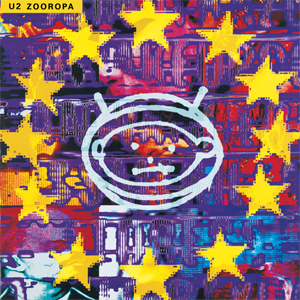
Zooropa is the eighth studio album by Irish rock band U2. Produced by Flood, Brian Eno, and the Edge, it was released on 5 July 1993 on Island Records. Inspired by the band's experiences on the Zoo TV Tour, Zooropa expanded on many of the tour's themes of technology and media oversaturation. The record was a continuation of the group's experimentation with alternative rock, electronic dance music, and electronic sound effects that began with their previous album, Achtung Baby, in 1991.

"Where the Streets Have No Name" is a song by Irish rock band U2. It is the opening track from their 1987 album The Joshua Tree and was released as the album's third single in August 1987. The song's hook is a repeating guitar arpeggio using a delay effect, played during the song's introduction and again at the end. Lead vocalist Bono wrote the lyrics in response to the notion that it is possible to identify a person's religion and income based on the street on which they lived, particularly in Belfast. During the band's difficulties recording the song, producer Brian Eno considered erasing the song's tapes to have them start from scratch.
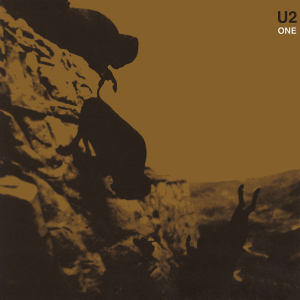
"One" is a song by Irish rock band U2. It is the third track from their seventh album, Achtung Baby (1991), and it was released as the record's third single on 24 February 1992. During the album's recording sessions at Hansa Studios in Berlin, conflict arose between the band members over the direction of U2's sound and the quality of their material. Tensions almost prompted the band to break up until they achieved a breakthrough with the improvisation of "One"; the song was written after the band members were inspired by a chord progression that guitarist the Edge was playing in the studio. The lyrics, written by lead singer Bono, were inspired by the band members' fractured relationships and the German reunification. Although the lyrics ostensibly describe "disunity", they have been interpreted in other ways.
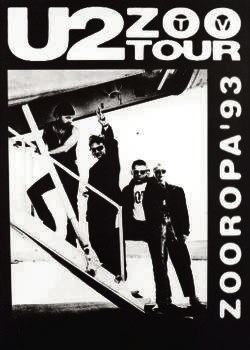
The Zoo TV Tour was a worldwide concert tour by rock band U2. Staged in support of their 1991 album Achtung Baby, the tour visited arenas and stadiums from 1992 to 1993. It was intended to mirror the group's new musical direction on Achtung Baby. In contrast to U2's austere stage setups from previous tours, the Zoo TV Tour was an elaborately staged multimedia spectacle, satirising television and media oversaturation by attempting to instill "sensory overload" in its audience. To escape their reputation for being earnest and over-serious, U2 embraced a more lighthearted and self-deprecating image on tour. Zoo TV and Achtung Baby were central to the group's 1990s reinvention.

"Numb" is a song by Irish rock band U2. It is the third track from their eight album, Zooropa (1993), and was released in June 1993 by Island Records and PolyGram as the album's first single. The song features a monotonous mantra of "don't" commands spoken by guitarist the Edge amidst a backdrop of various sound effects and samples. The noisy composition and lyrical concept for "Numb" were inspired by the theme of sensory overload, which had prominently been incorporated into the Zoo TV Tour. Lead singer Bono and drummer Larry Mullen Jr. provided backing vocals on the track.
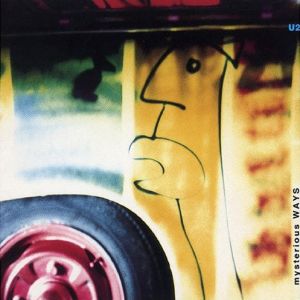
"Mysterious Ways" is a song by Irish rock band U2. It is the eighth track from their 1991 album, Achtung Baby, and was released as the album's second single on 2 December 1991. The song began as an improvisation called "Sick Puppy", with the band liking only the bass part that bassist Adam Clayton composed. The band struggled to build a song from it, with vocalist Bono and producer Daniel Lanois arguing intensely during one songwriting session. The song's breakthrough came after guitarist the Edge began experimenting with the Korg A3 effects unit. "Mysterious Ways" features a danceable beat, funky guitar hook, and conga-laden percussion, as well as mystical lyrics by Bono about romance and women.

"The Fly" is a song by Irish rock band U2. It is the seventh track from their 1991 album, Achtung Baby, and it was released as the album's first single on 21 October 1991 by Island Records. "The Fly" introduced a more abrasive-sounding U2, as the song featured danceable hip-hop beats, industrial textures, distorted vocals, and an elaborate guitar solo. Lead vocalist Bono described the song as "the sound of four men chopping down The Joshua Tree", due to its departure from the sound that had traditionally characterised the band in the 1980s.
"Zoo Station" is a song by Irish rock band U2. It is the opening track from their 1991 album Achtung Baby, a record on which the group reinvented themselves musically by incorporating influences from alternative rock, industrial, and electronic dance music. As the album's opening track, "Zoo Station" introduces the band's new sound, delivering industrial-influenced percussion and several layers of distorted guitars and vocals. Similarly, the lyrics suggest the group's new intents and anticipations. The introduction, featuring an "explosion" of percussion and a descending glissando for a guitar hook, was meant to make the listener think the album was mistakenly not U2's latest record or that their music player was broken.
"Until the End of the World" is a song by rock band U2 and the fourth track from their 1991 album Achtung Baby. The song began as a guitar riff composed by lead vocalist Bono from a demo, which the band revisited with success after talking with German filmmaker Wim Wenders about providing music for his film Until the End of the World. The song's lyrics describe a fictional conversation between Jesus Christ and Judas Iscariot. The first verse discusses the Last Supper; the second is about Judas identifying Jesus with a kiss on the cheek in the Garden of Gethsemane; and the final is about Judas' suicide after being overwhelmed with guilt and sadness.
"Ultraviolet (Light My Way)" is a song by Irish rock band U2. It is the tenth track from their seventh studio album Achtung Baby. Ostensibly about love and dependency, the song also lends itself to religious interpretations, with listeners finding allusions to the Book of Job and writers finding spiritual meaning in its invocation of the light spectrum.
"The Wanderer" is a song by Irish rock band U2, and the tenth and final track from their 1993 studio album, Zooropa. It is one of the few U2 songs without Bono on lead vocals, instead featuring country singer Johnny Cash. Based on the Old Testament's Book of Ecclesiastes and its narrator "The Preacher", the song lyrically describes the narrator wandering through a post-apocalyptic world "in search of experience", sampling all facets of human culture and hoping to find meaning in life. Cash's haggard voice is juxtaposed against a synthesised bassline and mostly electronic instrumentation.
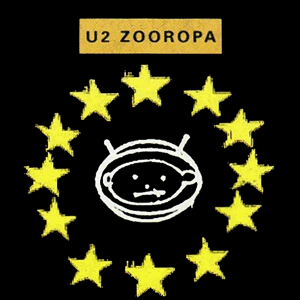
"Zooropa" is a song by Irish rock band U2, and is the opening track from their 1993 album of the same name. The song was the result of combining two pieces of music, the first of which was conceived in the studio, and the second of which was a soundcheck recording from one of the group's concert tours that was discovered by guitarist the Edge. The lyrics were written by lead vocalist Bono and describe two characters in a brightly lit city in a futuristic version of European society. Some lyrics in the song were taken directly from advertising slogans, and they also featured the phrase "dream out loud", which has appeared in other U2 media. The song touched on several themes, including moral confusion and the future of European society.
This is a timeline of the history of rock band U2:
"Love Is Blindness" is a song by rock band U2, and the twelfth and final track on their 1991 album Achtung Baby. The song was written on piano by lead singer Bono during the recording sessions for U2's 1988 album Rattle and Hum. Originally intending to give the song to singer Nina Simone, the band decided to keep it for Achtung Baby after playing it together. Thematically, the song describes a failing romance, mixing personal themes with imagery of metaphorical acts of terrorism. During the recording sessions for Achtung Baby, guitarist the Edge separated from his wife, Aislinn O'Sullivan. The separation had a major effect on the development of the song; Bono said that the ending guitar solo was a cathartic experience for the Edge, as he snapped several guitar strings during the recording.

"Stay " is a song by Irish rock band U2. It is the fifth track on their eighth album, Zooropa (1993), and it was released as the album's third single on 22 November 1993 by Island Records. The song reached number one in Ireland and reached the top 10 in Australia, Iceland, the United Kingdom, and several other countries. The accompanying music video, directed by Wim Wenders, was shot in Berlin, Germany. The earliest incarnation of the song developed during sessions for the group's 1991 album Achtung Baby. It was written for and inspired by Frank Sinatra and bore his surname as the original working title. An alternative recording was used in the 1993 film Faraway, So Close!, also by Wim Wenders.
"So Cruel" is a song by rock band U2. It is the sixth track on their 1991 album Achtung Baby, concluding side one of the album. The song was written at Elsinore in Dalkey. While audio engineer Flood changed reels to listen to a demo of another song, lead singer Bono began to improvise a song on guitar. The rest of the band quickly joined in, creating the first take of the song. It was developed as an acoustic track, with Flood adding overdubs and additional elements later. Bassist Adam Clayton and Flood noted that the technology in the studio was crucial in transforming the acoustic song into the final mix.
"Daddy's Gonna Pay for Your Crashed Car" is a song by Irish rock band U2 and the sixth track from their 1993 studio album Zooropa.
References
Footnotes
- ↑ "Acrobat — U2". 21 May 2023.
- 1 2 3 4 5 6 7 8 Stokes (2005), p. 108
- 1 2 Bailie, Stuart (13 June 1992). "Rock and Roll Should Be This Big!". NME . Archived from the original on 22 July 2012.
- 1 2 3 4 Achtung Baby (CD). U2. Canada: Island Records. 1991. 510 347-2.
{{cite AV media notes}}: CS1 maint: others in cite AV media (notes) (link) - ↑ Flanagan (1996), p. 444
- 1 2 3 Stewart, Dave (host), Bono, The Edge (24 November 2006). Off the Record with Bono and The Edge (Television production). HBO.
- 1 2 3 4 5 McCormick (2006), p. 228
- ↑ Kindergarten - The Alternative Achtung Baby (Boxset). U2. Canada: Universal Music Group. 2011. 2782293.
{{cite AV media notes}}: CS1 maint: others in cite AV media (notes) (link) - ↑ Assayas (2005), p. 106
- ↑ Greene, Andy (17 September 2014). "Reader's Poll: The 10 best U2 deep cuts". Rolling Stone . Retrieved 18 September 2014.
- 1 2 Flanagan (1996), p. 20
- ↑ Flanagan (1996), p. 187
- 1 2 Jackson, Joe (19 May 1993). "The Magical Mystery Tour". Hot Press. Archived from the original on 20 October 2012. Retrieved 27 September 2011.
- 1 2 Luerssen (2010), p. 262
- ↑ Delancey (2006), pp. 130-131
- ↑ Cleveland (2006), p. 182
- ↑ Brothers (1999), p. 257
- ↑ Brothers (1999), pp. 251, 257
- 1 2 3 Martin, Gavin (April 2009). "Achtung Baby". The Ultimate Music Guide. No. U2. Uncut. p. 77.
- ↑ Wurtzel (2003), p. 97
- ↑ "Achtung, rock fans : U2 hasn't lost its grip on first place". Kitchener Record . Kitchener. 28 November 1991. p. C9.
- ↑ Morse, Steve (15 November 1991). "U2 Bounces Back". The Boston Globe. Archived from the original on 15 October 2010.
- ↑ Potter, Greg (21 November 1991). "Achtung Baby: faith and flesh with a kick". The Vancouver Sun . p. 6.
- ↑ Pareles, Jon (17 November 1991). "U2 Takes a Turn From the Universal To the Domestic". The New York Times . Archived from the original on 2014-10-14. Retrieved 27 September 2011.
- ↑ Wyman, Bill (29 November 1991). "Achtung Baby". Entertainment Weekly . Archived from the original on 2011-06-07. Retrieved 27 September 2011.
- ↑ Stokes (2005), pp. 111–112
- ↑ de la Parra (2003), p. 136
- ↑ "Lyrics: Always". U2.com. Live Nation . Retrieved 25 November 2010.
- ↑ Beautiful Day (CD). U2. Europe: Island Records. 2000. CID766.
{{cite AV media notes}}: CS1 maint: others in cite AV media (notes) (link) - ↑ Mallet, David (director), U2 (1998). PopMart: Live from Mexico City (Concert film). Island Records.
- 1 2 de la Parra (2003), p. 151
- ↑ Williams, Willie (13 July 2012). "Anticipation and Payoff" . U2.com. Live Nation . Retrieved 24 July 2012.
- ↑ "Acrobat". U2gigs.com. Retrieved 2 May 2018.
- ↑ Greene, Andy (3 May 2018). "U2 Dig Deep at Transcendent 'Experience' Tour Opener in Tulsa". Rolling Stone . Retrieved 28 August 2018.
- ↑ Doyle, Tom (September 2018). "Grand Gestures". Q . pp. 104–107.
- ↑ Pareles, Jon (3 May 2018). "Review: U2 Is Still Fighting for the American Dream". The New York Times . Retrieved 3 September 2018.
- ↑ Rodman, Sarah (20 June 2018). "Checking in with U2's Adam Clayton and the Edge on the band's Experience + Innocence trek". Entertainment Weekly . Retrieved 23 August 2018.
- ↑ Greene, Andy (29 May 2018). "U2's Adam Clayton Talks 'Experience' Tour, Possible Plans for 2019". Rolling Stone . Retrieved 24 August 2018.
- ↑ Leas, Ryan (27 June 2018). "U2 Bring The Moving, Bombastic Spectacle Of Experience To MSG". Stereogum . Retrieved 3 September 2018.
- ↑ Keveney, Bill (16 May 2018). "Review: Fresh U2 embraces the present in concert tour, but still plays some greatest hits". USA Today . Retrieved 3 September 2018.
- ↑ With or Without You (CD). Kane. Netherlands: BMG Records. 2000. 7432 1 81957 9 2.
{{cite AV media notes}}: CS1 maint: others in cite AV media (notes) (link) - ↑ "What's On Your Free CD?". Q . December 2011. pp. 6–7.
Bibliography
- Assayas, Michka; Bono (2005). Bono: In Conversation with Michka Assayas. New York: Penguin Group. ISBN 1-57322-309-3.
- Brothers, Robyn (1999). "Time to Heal, 'Desire' Time". In Kevin J. H. Dettmar and William Richey (ed.). Reading Rock and Roll: Authenticity, Appropriation, Aesthetics . New York: Columbia University Press. ISBN 0-231-11399-4.
- Cleveland, Timothy (2006). "Chapter 13: "What You Don't Know, You Can Feel It Somehow:: Knowledge, Feeling, and Revelation in U2". In Mark A. Wrathall (ed.). U2 and Philosophy: How to Decipher an Atomic Band . Popular Culture and Philosophy. Vol. 21. Chicago: Carus Publishing Company. ISBN 978-0-8126-9599-1.
- de la Parra, Pimm Jal (2003). U2 Live: A Concert Documentary (second ed.). New York: Omnibus Press. ISBN 978-0-7119-9198-9.
- Delancey, Craig (2006). "Chapter 9: Why Listen to U2?". In Mark A. Wrathall (ed.). U2 and Philosophy: How to Decipher an Atomic Band . Popular Culture and Philosophy. Vol. 21. Chicago: Carus Publishing Company. ISBN 978-0-8126-9599-1.
- Flanagan, Bill (1996). U2 at the End of the World (Paperback ed.). New York: Delta. ISBN 978-0-385-31157-1.
- Luerssen, John D. (2010). U2 FAQ . Milwaukee: Backbeat Books. ISBN 978-0-87930-997-8.
- Stokes, Niall (2005). U2: Into The Heart: The Stories Behind Every Song (Third ed.). New York: Thunder's Mouth Press. ISBN 1-56025-765-2.
- U2 (2006). McCormick, Neil (ed.). U2 by U2 . London: HarperCollins Publisher. ISBN 0-00-719668-7.
{{cite book}}: CS1 maint: numeric names: authors list (link) - Wurtzel, Elizabeth (2003). "Me2". In Hank Bordowitz (ed.). The U2 Reader: A Quarter Century of Commentary, Criticism, and Reviews. Milwaukee: Hal Leonard. ISBN 0-634-03832-X.